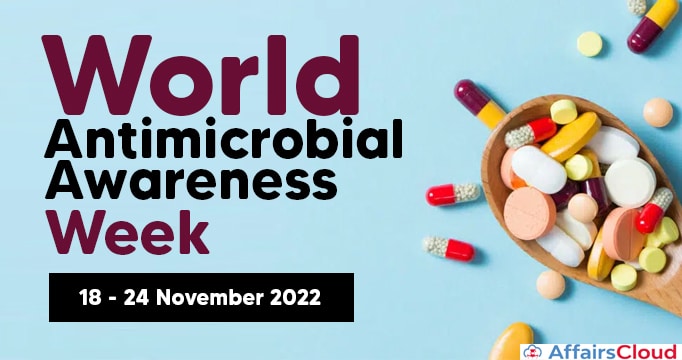
World Antimicrobial Awareness Week (WAAW) is an annual global campaign held from November 18 to 24 to raise awareness of the growing problem of Antimicrobial Resistance (AMR).
- The purpose of the week is to raise awareness of global AMR, promote best practices among stakeholders in One Health, and encourage better practices among the general public, medical professionals, and policymakers.
The World Antimicrobial Awareness Week (WAAW) 2022 is observed from November 18–24, 2022, and its theme is “Preventing Antimicrobial Resistance Together.”
What is Antimicrobial resistance (AMR)?
Antimicrobial resistance (AMR) is a condition in which bacteria, viruses, fungi, and parasites evolve over time and cease to be responsive to medicines.
- This makes infections more difficult to treat and increases the risk of transmission of infectious diseases, severe illness and death.
According to new global estimates, nearly 5 million human deaths globally in 2019 were associated with bacterial AMR, with 1.3 million directly caused by bacterial AMR.
Key Points:
i.This campaign is supported by 4 international organizations (the “Quadripartite Organisations”), including the United Nations Food and Agriculture Organization (FAO), the United Nations Environment Programme (UNEP), the World Health Organization (WHO), and the World Organization for Animal Health (WOAH, founded as the OIE).
ii.The quadripartite organizations have announced the WAAW 2022 theme and unveiled a new platform called the Antimicrobial Resistance Multi-Stakeholder Partnership Platform.
- This platform aims to guarantee that the rising dangers and effects of AMR are addressed globally.
ii.The slogan of WAAW remains as ‘Antimicrobials: Handle with Care’.
iii.The 68th World Health Assembly in May 2015 approved a global action plan to address the issue of rising antibiotic and other antimicrobial drug resistance.
AMR Will Reduce Global Annual GDP by 3.8% By 2050: WHO
The World Health Organization (WHO) estimates that Antimicrobial Resistance (AMR) is a major threat to global health, food security, and development, and it will reduce global annual Gross Domestic Product (GDP) by 3.8% by 2050.
- The WHO has raised concerns that if ignored, it could result in a GDP deficit of USD 3.4 trillion annually, forcing 24 million more people into severe poverty over the next decade.
Key Points:
i.The WHO South-East Asia Region, which is highly susceptible to the emergence and spread of AMR, has made preventing and tackling AMR one of its eight flagship priorities since 2014.
ii.In accordance with the Global Action Plan on AMR, adopted in 2015, each member state has established a multisectoral working group or coordination committee on AMR.
About the World Health Organisation (WHO):
Director-General – Dr. Tedros Adhanom Ghebreyesus
Headquarters – Geneva, Switzerland
Establishment – 1948




